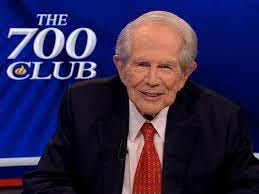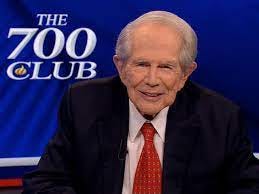For all of the excellent scholarship about the Rev. Jerry Falwell and the emergence of the Moral Majority that resulted in what appears to be a permanent alignment between Christian Conservatives and the Republican party (to the detriment of both), I’ve been thinking that the role of Pat Robertson is larger.
Robertson died last week at the age of 93 but his legacy will go on for good or for ill. An important disclaimer: I don’t watch religious television, so the only time I ever saw the 700 Club was during long-ago visits to my in-laws’s house, where is seemed to the only thing on.
Both Falwell and Robertson adopted a prophetic preaching style, but where the former spoke in sermon-like prose, Robertson used folksy one-offs in his role as the 700 Club host. He opined on all sorts of matters.1
Some of his views were incendiary, others somewhat hard to track. His usually personable style contrasted with doom and gloom preachers (including all those angry preachers making videos in their cars).
What I think makes Robertson unique isn’t simply his style but his entrepreneurial sense of how to take structures of contemporary society and create unique Christian counterparts that gained a legitimacy in the public eye. His obituary in the New York Times put it like this:
Mr. Robertson built an entrepreneurial empire based on his Christian faith, encompassing a university, a law school, a cable channel with broad reach, and more. A product of a family with politics in its veins, he also waged a serious though unsuccessful campaign for the 1988 Republican presidential nomination, resigning as a Baptist minister as he began the run in the face of criticism about mixing church and state.
The loss did not dampen his political fervor; he went on to found the Christian Coalition, which stoked the conservative faith-based political resurgence of the 1990s and beyond.
His political history is an important part of the story. Being the son of a US Senator and himself a one-time candidate for president meant that he was more versed in the role of institutions than most individually-minded preachers. He used those insights in significant ways. Another story in the Times by Elizabeth Dias noted:
Mr. Robertson deserves credit for creating infrastructure for the modern-day Christian conservative movement, from his media empire to his establishment of a Christian university and the way he “changed the face of evangelical Christianity with respect to Israel,” said Rick Santorum, former Republican senator from Pennsylvania and presidential candidate.
What was the 700 Club but a Christian version of Johnny Carson’s Tonight show? You have a host who is the center of attention, the trusty sidekick,2 and a retinue of guests who come to interact with Robertson and provide him the opportunity to share his folksy style.
Spinning off from the 700 Club was CBN News. A Christian version of CNN, it highlighted both Christian voices and politically conservative voices and helped the two become fused.3 But broadcasting was just the start.
In 1977, Robertson founded CBN University, which became Regent University in 1990. Liberty University had been founded six years earlier. The role of well-known religious figures in creating institutions that compete with existing Christian Universities has been significant.4
Another disclaimer: I have had a number of friends and colleagues over the years who have earned doctorates from Regent in a variety of fields. I know them to be good Christian scholars but I’ve always wondered about Regent’s graduate culture.
Of particular importance was the addition of Regent’s School of Law. Founded in 1986 and accredited by the ABA a decade later, it provides legal education with a conservative style. One result of this was a pipeline running from the law school to Republican administrations. A Wikipedia entry on Regent suggests that 150 graduates served in the George W. Bush administration. Other graduates of the law school include such notable figures as Jay Sekulow5 (who defended Trump in the first impeachment) and Pennsylvania gubernatorial candidate Doug Mastriano. I’m not sure how many Regent Law graduates found their way onto the Federalist Society’s magic list, but I imagine it’s a lot.
Even more significant was the political organizing. Beginning with his presidential run in 1988, he recognized the role churches could play in supporting politics. Running against GHW Bush and Bob Dole, he was the religious candidate.6 He mobilized voters to his cause but ended his race after Iowa. Still, the idea of aligning churches and conservative causes remained. He created the Christian Coalition and named Ralph Reed as its leader. Over the intervening decades, state and local chapters encouraged and enabled conservative evangelicals to run for office (especially at city council and school board levels). As historian Ron Perlestein told the Washington Post’s Greg Sargent last week:
Every time a riot breaks out at a school board meeting because the board wants to recognize that gay people exist, that’s Pat Robertson’s shadow. Every time a crusade against teaching the history of race in America leads to a school limiting access to Amanda Gorman’s inaugural poem, that’s Pat Robertson’s shadow.
What will be the lasting legacy of Robertson’s empire? My friend Karen Swallow Prior shared insights in the Elizabeth Dias piece mentioned above.
Many young evangelicals are increasingly frustrated with that political alliance, and with the moral failures of previous Christian generations on issues like sexual abuse, said Karen Swallow Prior, a professor at Southeastern Baptist Theological Seminary. Some are seeking reform, using social media tools of their own day to push back against the politicization of religious faith, even as conservative Christian institutions try to double down on their political might.
“What we are seeing now is the younger generations of Christians who are using their technology to break open the cracks in the foundation of what they built,” Ms. Swallow Prior said.
While I agree with Karen’s observations, it will take a long time for change to take place. There is simply nothing comparable to Robertson’s empire among moderates or even the center left. It’s not clear that such a thing would even be desirable if it could be built.
But it seems undeniable that Pat Robertson’s efforts at building a conservative religious political infrastructure have advanced the goals of those on the right. For those who want to find ways of pushing back, his work underscores the challenges that fight must overcome.
He was one of those religious leaders who somehow turned himself into an expert on everything (looking at you, Dobson!) regardless of any actual expertise.
Actually, Robertson was somewhat innovative in having a black man and then a woman as his sidekick, something regular talk shows have never done.
Its primary commentator, David Brody, wrote The Faith of Donald J. Trump.
Not that there was a lot of difference between those institutions and Regent, except for Regent being well-endowed due to the success of CBN.
Robertson also founded the American Center for Law and Justice, a Christian Legal Organization headed by Sekulow.
His decision to resign his ministerial credentials to not mix politics and religion seems quaint from today’s vantage point.





I hesitate to admit this, but I'd like to share a small bit of my story. Forgive me if I've shared some of this before.
I was not raised in the church and didn't become a Christian until a senior in college. The only reason I became a Christian was a love for Jesus and a desire to be like him. I had no concept of Genesis, Adam and Eve, a magic garden with a talking reptile forbidden fruit, Paul--none of that. It was just Jesus--that was enough for me. I knew I fell short because I knew me, not because of the doctrine of original sin. Once in a church in my mid 20s, I began to get involved in church life and became sensitive to spiritual matters and my need to faithfully attend and learn from more mature Christians. All of this was going on when Falwell and Robertson were at their peak (and getting involved in politics), and many of the Christians I knew watched Falwell, Robertson, voted Republican to fight abortion, etc. I simply assumed, "These are mature, thoughtful Christians of many years, I should do likewise and learn from them." I was steeped in that sort of world for a long time. It was about 15-20 years ago. in my late 40s, that I started to explore other Christian traditions and thinkers and I was amazed--and blessed!
I've emerged from the confining bubble I was in and I'm grateful. (And I'm a little embarrassed about the years I wasted immersed in a very one-dimensional, rather black and white world where to be a Christian was to be a Republican.) Becoming a Christian and growing up isolated in the Old-time Gospel Hour, CBN, and the Moral Majority wasn't the best for me. To be a Christian in the place I was meant to vote Republican, embrace a 6000-year-old Earth, etc. But that's the culture I was in. A somewhat liberal Christian intellectual to me in those days was Francis Schaeffer!
Thanks John! God bless.